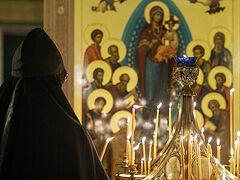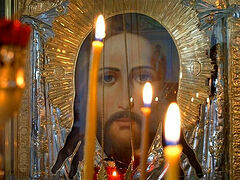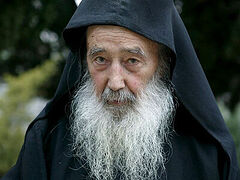The Orthodox Church is a liturgical Church and one of prayer. We believe that the grace of God, given to the world through the Crucifixion and the Resurrection of our Lord Jesus Christ, extends to the entire Church and is communicated to every believer, primarily through prayer. Prayer is the most intimate activity of a believer and the yardstick of his spiritual life. It is performed in the heart, where the grace that we received in the sacrament of Baptism is hidden. This grace given to us by God presupposes our efforts for its further development and work in our hearts.
Prayer is undoubtedly the highest expression of our love for God. Therefore, we can say that we love God as much as we pray. Everything in the Orthodox Church—architecture, church paintings, icons, hymns, singing, and rites full of symbolism—is designed to create a prayerful atmosphere, to help believers pray from the heart, in experiencing their mystical union with God. Through the Holy Church sacraments and services, through daily prayers, through our thanksgivings and prayer petitions, through the Word of God, through the Holy Mysteries the Lord Jesus Christ is invisibly present among the faithful. The Eucharist symbolically presents Christ to us in the fullness of His earthly life. During the Divine Liturgy we become like His contemporaries—we listen to His Word in the Gospel readings, immerse ourselves in contemplation of His image on icons, feel His fragrance in the aroma of incense, and like the Apostles at the Last Supper, we are at the same table with Him when we partake of His Body and Blood.
Through prayer, which must continue incessantly—that is, at any time, in any place and as often as possible—we enter into living communion with God. In this way we participate in the life of God Himself, Who is the Trinity of love of the three Divine Persons. The love of God is shed abroad in our hearts by the Holy Ghost (Rom. 5:5)—this should be the fruit of prayer. And it must be extended to our neighbors as well. A believer who prays sincerely, seriously and from the bottom of his heart is filled with love for his neighbors and for the whole world around him.
Prayer, in turn, is the first fruit of faith, as a gift to man from God and its most intimate expression. Because in order to pray we must first come to believe in God. Although, we know of cases when people pray that God reveal to them that He exists. And God reveals Himself to them! The prayer of Blessed Augustine is well known: “O Lord, Thou hast formed us for Thyself, and our hearts are restless till they find rest in Thee.” Prayer is the rest of the soul in God. And is there such a person on earth who does not seek and crave for peace of heart and mind?
Let us consider in more detail the question of church prayer and personal prayer. The services of the Orthodox Church are extremely rich in hymns and stichera, in which various petitions, praise and thanksgiving to God are offered up. The Orthodox faith, in essence, has a monastic leaven and a deep penitential, but at the same time Paschal character. It was monks who always strove to live till their death according to the Gospel to the utmost, following the example of the poor, chaste and obedient first Ascetic—Christ Himself. Thus, they set an example for believers. Monks are especially called to prayer. The monastic principle of life comes from the testament of the holy Apostle Paul: Pray without ceasing (1 Thess. 5:17).
Church prayer has a special contrite or penitential character, because sin is a universal, painful reality that means the alienation and separation of man from God. If a person realizes his sin and asks for God’s forgiveness, it should not paralyze him and plunge him into despair, but on the contrary, through repentance new energy should awaken in him to struggle with sin and do good. The pain of sin is eventually transformed into victory through the Resurrection of Christ. “For behold, through the Cross joy has come into all the world,” we sing at almost every Vigil to celebrate on Sunday a little Pascha. Orthodox spirituality is largely that of joy and Resurrection. St. Seraphim of Sarov († 1833), one of the greatest Russian ascetics in the history of the Orthodox Church, greeted all his visitors who flocked to him by the thousands with the words, “My joy, Christ is Risen!”
Through the seven sacraments of the Church, through other services and prayers of the Church, the saving grace of God is given to believers for their faith. But what is the Church? It is a community of believers who gather for prayer to celebrate the Eucharist and other sacraments. The Apostle Paul tells us that the Church is the Body of Christ (cf. Col. 1:24). It means that the members of the Church in their unity form a living body similar to a human body. But the Body of Christ is also the Eucharist, because the Eucharistic bread and wine become the Body and Blood of Christ through the prayer of a celebrant, and so the faithful really become the Body of Christ or the Church of Christ. Without the Eucharist, the Church cannot be the Body of Christ, but will remain just an assembly of people. The holy Apostle Paul says: Now ye are the body of Christ, and members in particular (1 Cor. 12:27); For we being many are one bread, and one body: for we are all partakers of that one bread (1 Cor. 10:17). The Eucharist is the source of all the sacraments.
Believers are called to participate in services actively, sing prayers together, and partake of the Body and Blood of Christ together. The faithful experience every Sunday as the Lord’s Day, primarily through their participation in the Liturgy. A Christian who misses the Divine Liturgy three Sundays in a row without a sound reason becomes spiritually indifferent and remains without the strengthening grace of the holy sacraments. The wedding garments (Mt. 22:11), in which we must take part in the Lord’s Supper, mean our reconciliation with those who have sinned against us, intense prayer, marital abstinence and Eucharistic fasting. A believer must purify his conscience in the sacrament of confession before receiving the Holy Mysteries.
No sincere believer can say that he does not need the Church, that God is everywhere, and therefore he can pray anywhere. This is an individualistic, egoistic way of thinking that ignores the fact that God Himself is the unity of Three Persons, that you can only fulfil yourself in unity with your neighbors. Our need for community with others is inherent in our very nature, because we were created in the image of God. We can fulfil ourselves as individuals in the image of the Divine Persons only when we are open to our neighbors and unite with them. The Church is the very place where we unite with our neighbors in love through common prayer and serving those who need help. Only in the Church and only through the Church can we overcome selfishness, which is the highest expression of sin. The Romanian theologian Fr. Dumitru Staniloae (1903–1993) called the Church a “laboratory of the Resurrection.” Through the holy sacraments and through common prayer we constantly experience our personal resurrection in the Church, overcoming our selfishness, which can lead us to spiritual death before physical death.
Personal prayer is inspired and supported by church prayer and is its continuation. It can be performed anywhere and anytime. Our prayer must be as frequent and good as possible. Early Christians, especially monks, frequently repeated certain verses from the Holy Scriptures (especially from the Psalms) attentively to occupy the mind with prayer continuously. Over time this prayer developed into the Jesus Prayer.: “Lord Jesus Christ, Son of God, have mercy on me, a sinner,” which was also inspired by the Gospel Parable of the Publican and the Pharisee.
It should be emphasized here that the Orthodox tradition does not distinguish between the spirituality of monastics and laity. Both monks and laypeople are called to attain the same spiritual heights, which in the language of the Bible are called perfection. When Christ says, Be ye therefore perfect, even as your Father which is in Heaven is perfect (Mt. 5:48), He addresses all people regardless of their social status. And although the lifestyles of monastics and laypeople differ, the goal of all Christians is the same. The same applies to prayer: laypeople and monks alike are called to unceasing prayer. This does not mean that we must stop working, but it means that we must turn our every action into prayer: And whatsoever ye do in word or deed, do all in the name of the Lord Jesus, giving thanks to God and the Father (Col. 3:17).
In post-war Romania, some monks from Antim Monastery in Bucharest founded a prayer group called the Burning Bush (Rugul Aprins in Romanian). The purpose of this movement was to spread the spirituality of hesychasm among intellectuals, with special attention to unceasing prayer. The results were stunning. Many people, while remaining active in society, mastered unceasing prayer—that is, they attained a state of prayer that is beyond all words. Unfortunately, after the Communists seized power in Romania, the prayer group was banned and its members were imprisoned.
 Of course, it is not easy for us to attain this prayerful state, because it is ultimately a gift from God. Nevertheless, efforts on the part of those who pray are absolutely necessary. Experienced father-confessors advise us to pray in the morning and in the evening, before and after meals, with the prayers that are in every prayer-book. The rest of the time—at work, on a journey, anywhere and anytime—try to say short prayers in your mind as often as possible; for example: “Lord, have mercy”, “Lord, help me”, “Lord, hasten to mine aid”, “Lord, do not forsake me, a sinner”, or pray the Jesus Prayer. It is also important to read the Holy Scriptures, especially the Psalms as penitential prayers and the New Testament.
Of course, it is not easy for us to attain this prayerful state, because it is ultimately a gift from God. Nevertheless, efforts on the part of those who pray are absolutely necessary. Experienced father-confessors advise us to pray in the morning and in the evening, before and after meals, with the prayers that are in every prayer-book. The rest of the time—at work, on a journey, anywhere and anytime—try to say short prayers in your mind as often as possible; for example: “Lord, have mercy”, “Lord, help me”, “Lord, hasten to mine aid”, “Lord, do not forsake me, a sinner”, or pray the Jesus Prayer. It is also important to read the Holy Scriptures, especially the Psalms as penitential prayers and the New Testament.
The most important thing in prayer is when we focus our attention on the words we say so that our mind shouldn’t be distracted by something else, but should descend into the heart. Every prayer of ours must become a prayer of the heart, because the center of our being is concentrated there. In fact, all energies that permeate us, our physical and psychological forces, are renewed in the heart. The mind itself is the energy of the heart. The mind will not find peace unless it descends into the heart, where its proper place is. The grace of the Holy Spirit, received by us in Baptism, dwells in the heart. If prayer remains at the level of the intellect, it does not touch the heart, remains purely intellectual, formal and fruitless. Such prayer does not bring joy and peace to the soul, but, on the contrary, causes fatigue and boredom. Our mind must descend into the heart, and with it prayer. We should pray with great attention, reverence and humility, being always mindful of our sinful state. We must also ask God to give us the gift of prayer. Because genuine prayer is a gift from God.
When we pray properly, purely, without extraneous thoughts, with humility and love for God, we feel the warmth of grace in the heart, spreading in our chest and throughout our body. Being filled with grace is expressed by our love for all people and for all Creation, in our fundamental unity with the world around us. Only in perfect unity with all people and with all Creation do we understand ourselves as personalities in the image of the Divine Persons. Otherwise we will remain in a state of selfish personalities who care only about themselves, pursuing only their own interests, ignoring others or even doing them harm. It is clear that in such a selfish state our soul will never find peace. We will never be grateful for what we have. Such people see enemies in their close ones and will blame them for their own failures.
Now let’s ask ourselves why it is so hard for us to attain pure prayer, which gives us peace of mind. This is because we are under the strong influence of the fall, which constantly divides the inner unity of our being. Our hearts are constantly attacked by extraneous thoughts and desires that break up their wholeness. Let’s not forget that sins and passions (a passion is a recurring sin that becomes a bad habit or vice) are unnatural to humans and are not part of our nature created by God. On the contrary, sin is something extremely abnormal and irrational out of all that exists. But we are so used to sin that we often do not realize what is really part of our original nature and what destroys us. Sin constantly eats away at a person, and unless we fight it, it gradually destroys us.
Prayer works in exactly the opposite direction. By grace it restores our nature. However, this is an extremely labor-intensive task, precisely because our minds are so easily distracted by worldly things. For all that is in the world, the lust of the flesh, and the lust of the eyes, and the pride of life, is not of the Father, but is of the world (1 Jn. 2:16). All this has such a strong effect on the minds of modern people that they cannot concentrate well on prayer or immediately return to worldly vanity after prayer. In order to pray properly, continuous ascetic efforts are needed. You should force your mind to turn away from external things and focus on the practice of prayer. But we should not stop praying even if our minds are constantly distracted during prayer. If we pray regularly and as often as possible, the mind will get used to prayer and will be more attentive to what it is doing. In this way, prayer will acquire quality and become pure, not overshadowed by extraneous thoughts. And at some point it will descend into our hearts simultaneously with our minds. Then the renewal of our being will begin.
In order for the mind to pray as purely as possible—that is, with attention concentrated in the heart—certain conditions are required. The Savior tells us: And when ye stand praying, forgive, if ye have ought against any: that your Father also which is in Heaven may forgive you your trespasses (Mk. 11:25); But thou, when thou prayest, enter into thy closet, and when thou hast shut thy door, pray to thy Father which is in secret (Mt. 6:6). He also says, What things soever ye desire, when ye pray, believe that ye receive them, and ye shall have them (Mk. 11:24). Therefore, we must pray with confidence that God will answer our prayers even if He does not fulfill them the way we wish. No prayer uttered with faith and humility will be in vain.
We must also forgive our neighbors who have sinned against us, because rancor prevents us from praying purely. We cannot pray when we are tense or too tired, because then we will not be able to penetrate into the “secret closets” of our hearts. Prayer requires both external and inward peace. In addition to these requirements, experienced father-confessors insist on the importance of fasting and other ascetic practices conducive to prayer. No one can pray on a full stomach, and the Holy Spirit does not dwell in those who seek physical pleasures. The more we abstain from eating and drinking, the easier it is for our minds to penetrate into our hearts.
Indulgence in eating and drinking directs our minds to sensual pleasures and incites bodily desires. Therefore, it is recommended in the Orthodox Church to fast every Wednesday and Friday throughout the year and during the four major fasts. Fasting can be total (on Holy Friday, Holy Saturday and Christmas Eve) or partial if we abstain from animal products. Prostrations and bows while reciting the Jesus Prayer or other short prayers also help us master prayer and teach us humility. It should be mentioned that fasting and other ascetic practices recommended by the Orthodox tradition are not aimed at the mortification of the body, but at the mortification of the sins and passions working through the body. A reasonable ascetic life is of great benefit for people. And only those who practice it realize this important truth.






